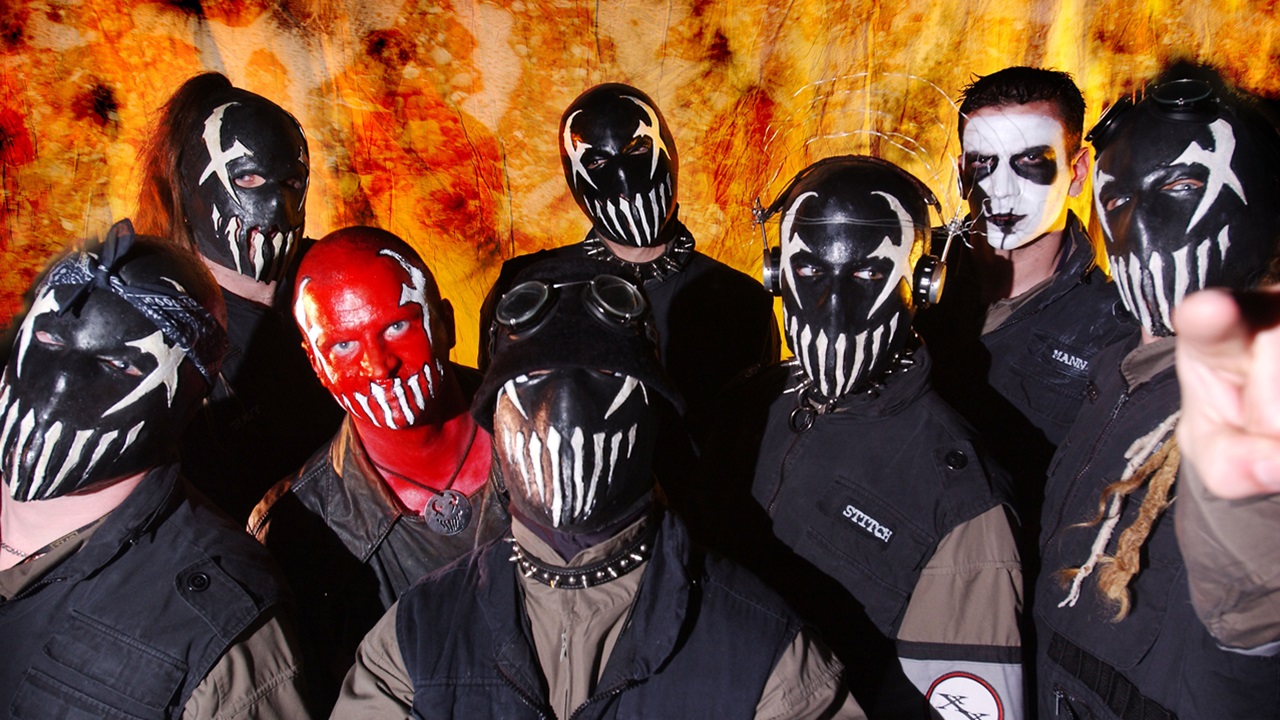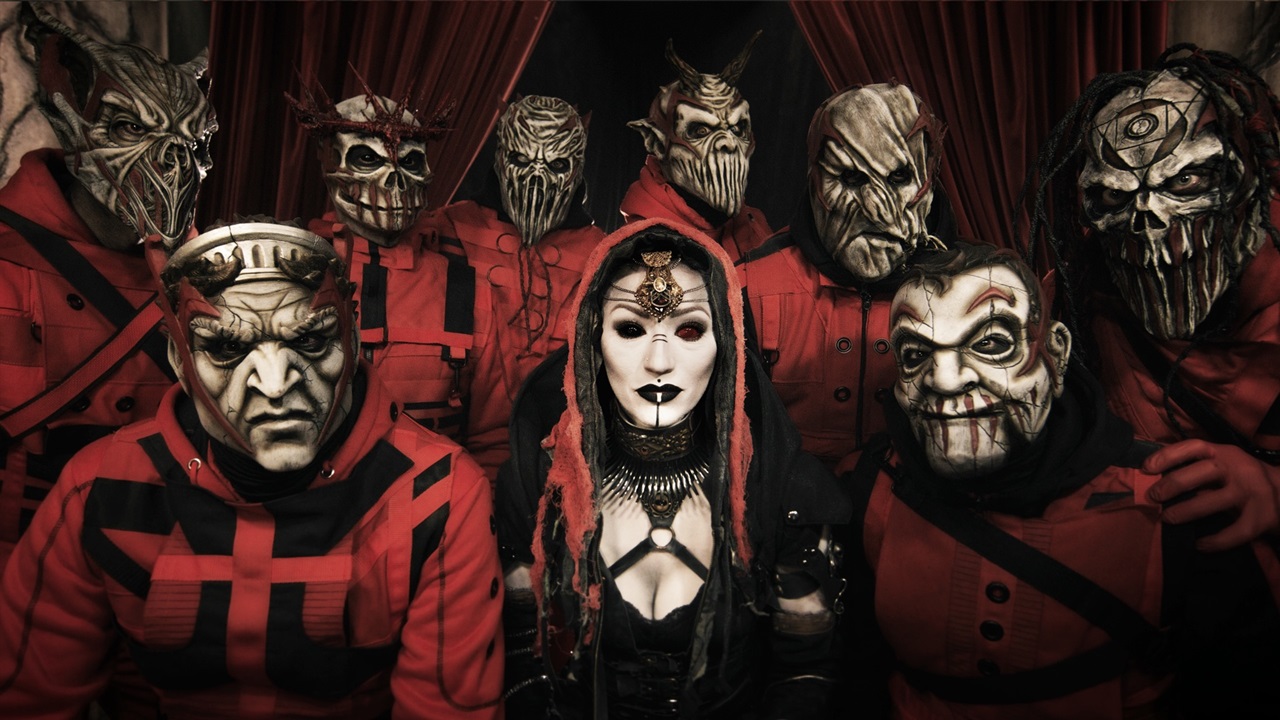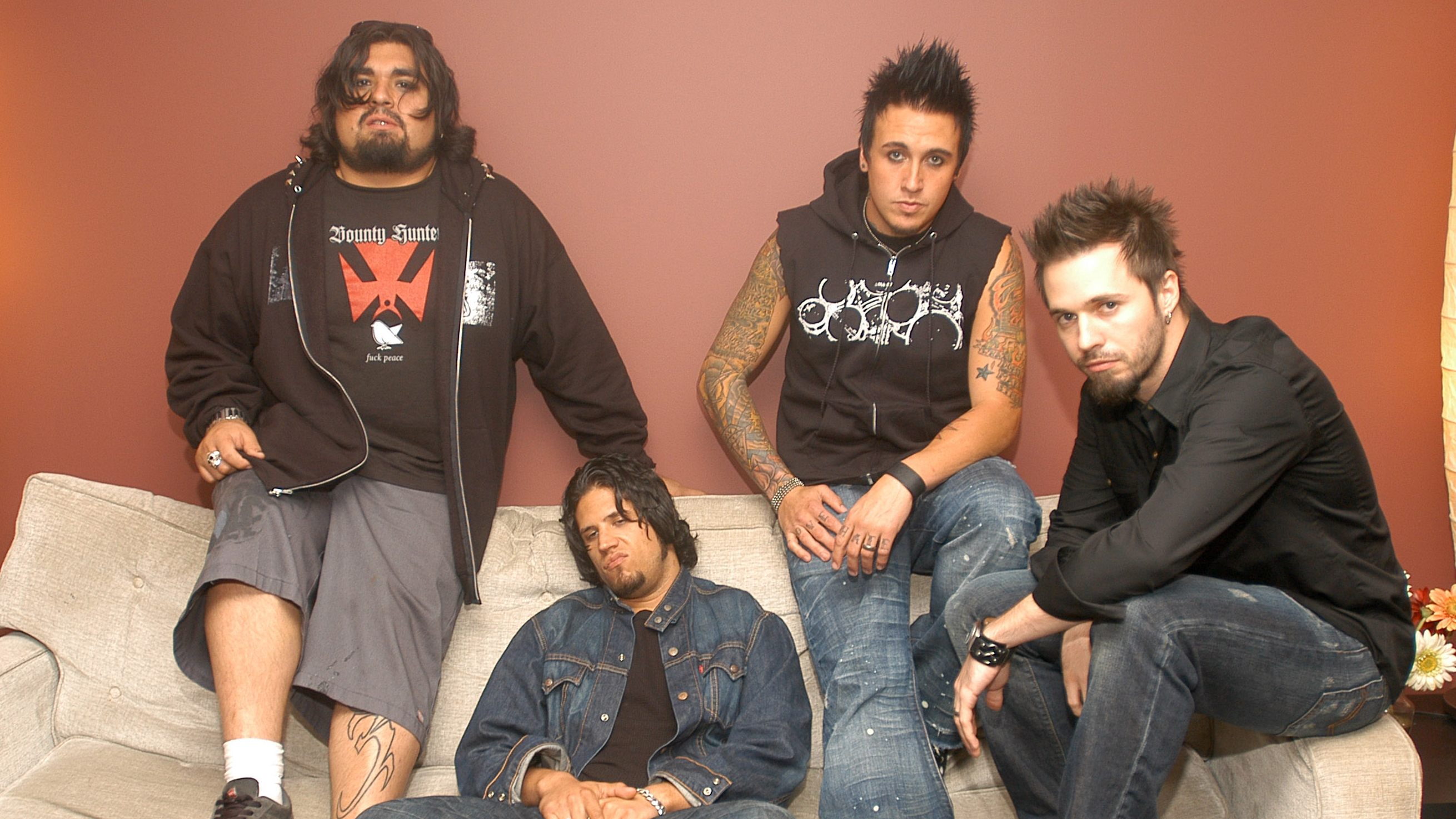"It’s not The Beatles, it’s not Metallica, but it wasn’t ever supposed to be." Mushroomhead blew up with nu metal and were rivals with Slipknot, but never got the dues they deserve
Mushroomhead laid the groundwork as metal's ultimate masked maniacs in the mid-90s

Steve ‘Skinny’ Felton is reflecting on more than three decades of grand ambition, relentless toil and missed opportunities. “Back then I had big hopes and dreams that we’d be Metallica one day,” says the drummer, leader and sole remaining original member of masked metal mavericks Mushroomhead, half sighing and half chuckling at the thought. “But it didn’t really pan out that way. I saw life doesn’t really work the way you think it does when you’re young. You think you know it all. At least I tried to do it all – whether I knew it all is a whole different story.”
Mushroomhead are one of the great cult metal bands of the last 30 years. The Cleveland, Ohio outfit were briefly swept up in the nu metal goldrush at the start of the new millennium, though they predated it by a good few years – as they did Slipknot, the band they were regularly, and often unfavourably, compared to. But despite a striking, and familiar, masks-and-boiler suit image, success never materialised, and members came and went – upwards of 20 people have been in the band, including Skinny himself. But through sheer bloody-mindedness, Mushroomhead have endured, releasing nine albums to date (the latest, Call The Devil, is out now).
Mushroomhead’s story dates back to 1993, when members of a number of existing bands based in and around Cleveland came together to form an altogether different beast. There were eight of them, and they wore home-made horror masks and adopted pseudonyms to maintain anonymity. They played chaotic live shows in clubs and basements while building a cult following – all of which might sound vaguely familiar to fans of another, rather more successful masked outfit.
The initial inspiration for the masks came from the larger-than-life theatrics of Kiss and Alice Cooper, as well as the more experimental art-rock antics of enigmatic avant garde collective The Residents, famed for wearing giant eyeballs on their head. “Were they the biggest band in the world?” the drummer says of the latter. “No, but they were doing whatever the fuck they wanted, and that really rang true to me.”
Add a similar love for Mike Patton’s work with Mr. Bungle (“an example of how not giving a fuck could be done properly”) and Mushroomhead were always destined to have their own streak of weirdness. That sense of individuality helped them build a dedicated local fanbase, but it didn’t necessarily lend itself to immediate mainstream success. The band’s first three albums – 1995’s Mushroomhead, 1996’s Superbuick and 1999’s M3 – all contained that experimental sensibility alongside a crunching metal aggression.
All three were released via small New Jersey label Eclipse, at a time when major labels dominated the game. It was the nu metal boom that finally saw Mushroomhead scooped up, alongside many other musical misfits. While they never entirely fitted in with that scene, Skinny has come to accept their place on the fringes of it.
“We got lumped into that category because that’s how you pushed current bands,” he recalls. “I look at it now as a time period. To a degree, at least, we stood out from the bands we were being associated with, but I understood what they were trying to do, selling a new era of metal.”
Sign up below to get the latest from Metal Hammer, plus exclusive special offers, direct to your inbox!
Mushroomhead finally joined the major label party with 2001’s XX, released by Universal and featuring songs cherry-picked from their first three albums. By that time, of course, another masked band had exploded out of the Midwest – Iowa, to be precise – leading many to assume that Mushroomhead were jumping on the Slipknot bandwagon. Today, Skinny is effusive in his praise of the band with whom Mushroomhead once had a fierce rivalry.
“Slipknot, man, amazing… one of the biggest heavy metal bands in the world,” he gushes when their name comes up. “Holy shit, it’s gigantically huge and what they have done is amazing. And I think it opens the doors for other bands as well as my own. People like this masked metal. They like theatrics.”
Things weren’t always so equitable. In a 2006 interview Skinny accused their Des Moines rivals of ripping off his own band: “They traded a platinum record for dignity, honour and respect. Corey Taylor says: ‘You cannot kill what you did not create.’ Maybe so. But I guess you can sure as fuck sell what you stole.”
The beef between the two bands was seemingly real – when Slipknot stopped off in Cleveland during a 1999 tour in support of their debut album, some Mushroomhead fans took exception to their presence.
“People came down and threw everything but rocks at us,” Corey later recalled. “They hit Paul [Gray, bassist] in the face with a fucking padlock the size of my fist, while we were onstage! When we got done playing, we took all our shit off and went into the audience. There were a lot of them, but there was all nine of us, Machine Head and all our friends in Amen. Let’s just say, we fucking handled it right there.”
“A bit of it over time has been inflated,” says Skinny today. “I wasn’t there personally and I’ve heard 20 different versions over the years. And let’s not forget that it was popular in that era to have beefs in bands and stack people against each other. It was huge with the West Coast and East Coast rappers. The media fuelled it and fans bought into it.”
Is there not a nagging feeling, though, that things could have been very different for your band if certain things had gone your way? Like if you’d signed to Roadrunner and got there first?
“No, because there were lots of people signing lots of bands in the day. It wasn’t like we got the exact same offer by the same guy who signed Slipknot. And I have a lot of compassion for them, because they’ve put up with a lot of bullshit just to make music and art, and they’ve lost good people. I commend them for everything they do and it just goes to show that I wasn’t that far off many years ago that this type of thing was going to be bigger than we even knew. I wasn’t wrong. It just wasn’t my band.”

Mushroomhead never did come close to the impact of Slipknot, but they did enjoy some success in their own right through XX and 2003’s XIII.
“We had some pretty high hopes, and you can hear it on the record, man. There’s some excitement on that album and it was all kind of a blur,” Skinny says. “We played Ozzfest, we started touring internationally, we played on bills with Down and Hatebreed and Tool. I just wished I’d taken the time to go and see some of the cities we were seeing. I was just so focused on doing the show and making sure the merch was set up and over-managing every job that we already had people hired for.”
XIII would went onto sell a creditable 400,000 copies, but that wasn’t enough for Universal, and the band and label parted ways. Mushroomhead continued to play and record, albeit on a reduced level. 2010’s Beautiful Stories For Ugly Children – named after the cult DC Comics series of the same name – and 2014’s The Righteous & The Butterfly might not have given Slipknot any sleepless nights, but they were successful enough for Skinny not to throw in the towel.
“Things were happening, man, we were touring all over,” he says. “We did Russia and Australia within the same few months in that year, which was another blur. Almost like the Universal days where it’s, ‘Alright, let’s light this fire and just go, go, go!’”
While there were some peaks, there were also plenty of troughs. The trials of being an independent band with far more members than many of their contemporaries – currently nine, including co-vocalists Jackie LaPonza and Steve Rauckhorst, the latter of whom replaced original singer Jeffrey Nothing in 2018 – are many. It must be a challenge, financially, keeping Mushroomhead going? Skinny laughs long and hard at the question.
“Every day, man,” he says. “It’s like, ‘Where can we get another loan?’ Take another credit card out here. Just do what you can to make shit work. We’re barely making money. Almost every one of us has a full-time, 40-hours-a-week other gig. Like, I will get a job for nine months ’til the next tour starts and quit if I have to.”
Those jobs have included 12 years as a machinist and stints working with carpentry, electrics and drywall. “None of us can go, ‘I’m going to play drums all day then go sit in my pool.’ I don’t have a pool and there were times when I could barely even afford a place to put my drums.”
Those financial hardships have been partly to blame for the constant churn of members in the Mushroomhead ranks.
“It’s always been that way,” says Skinny. “Every single album has seen a member change, so it’s never been a traditional band. It’s not The Beatles, it’s not Metallica, but it wasn’t ever supposed to be. It was originally a recording project that just kept being built and added onto, until we saw the energy of it and took it live. But it isn’t for everyone. People change their minds, people do it and then they lose their inspiration. It’s art and if you’re not inspired by it, then you probably shouldn’t be doing that form of it.
“It’s the natural evolution of things with this band. Have I always wanted these changes? No, but not knowing what comes next, that’s exciting to me as well. At least there’s no shortage of fresh energy and ideas coming in.”
Was there ever a time when your own motivation faltered and you considered calling it a day? “There have been many times when I wanted to call in sick… and who do I call in sick to? When it hits you like that it’s hard, but you’ve got to go, ‘This is my dream, not theirs.’ I really don’t feel different as far as inspiration goes. I wake up every day just like I did when I was 23 and I say, ‘How can I make this band bigger? What can I create today that I could possibly share with the world?’”
They may have as many members as they’ve ever had, but the Mushroomhead of 2024 is more musically streamlined than the collective that first sprang to life some 31 years ago. New album Call The Devil boasts bright streaks of melody in among slab-heavy riffs and that oddball penchant for avant-garde weirdness – the “bits of drama” as Skinny puts it – they’ve never quite put aside.
“I think of the Mushroomhead catalogue as being like an art museum,” he adds. “Every album is its own room within it, each song is its own piece; sculpture, painting whatever. And I think Call The Devil fits right in there within in the Halls of Shroom.”
While the personnel has changed quite extensively, Mushroomhead as an entity has never gone away. Contemporaries like Mudvayne have enjoyed a resurgence of interest and reunion tours are big business. Maybe that’s where Mushroomhead have gone wrong.
“Good luck to them and God bless them for having that itch to get back to it,” shrugs Skinny. “You can’t have a reunion if you never went away, but I genuinely feel blessed to have been able to have been able to make music and art every day. Even if I die tomorrow, that 30 years of music is still going to be there and that’s success to me. I don’t gauge it by the plaque on the wall, or the trophy on the shelf, or the amount of money in my bank.”
So is there anything at all that this lifer would change if he had the chance? “Maybe rethink the masks,” he says. “I’ve worn them for 30 years and it’s fucking brutal when it’s 104˚F! But really, I get to combine all my hobbies and passions in one, and I wouldn’t change a thing.”
Call The Devil is out now via Napalm Records
Paul Travers has spent the best part of three decades writing about punk rock, heavy metal, and every associated sub-genre for the UK's biggest rock magazines, including Kerrang! and Metal Hammer.


